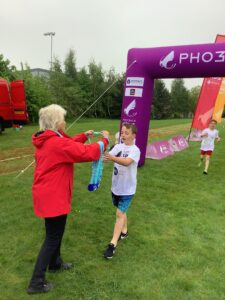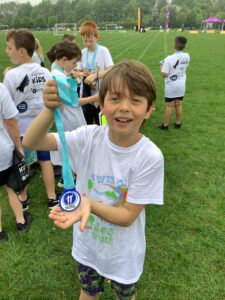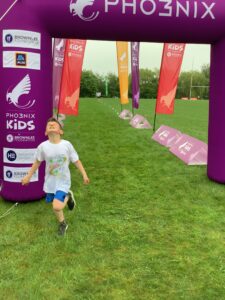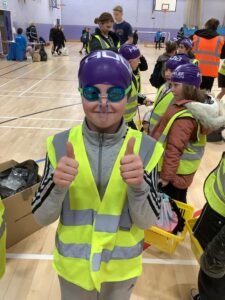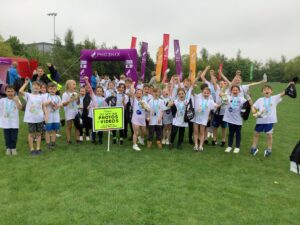Maths
In Maths, Y2 have been looking at the value of money and using different coins to make the same amount.

Y1 have been identifying whole and parts of the numbers 6-10 using the five and a bit structure and they have been looking at odd and even numbers.
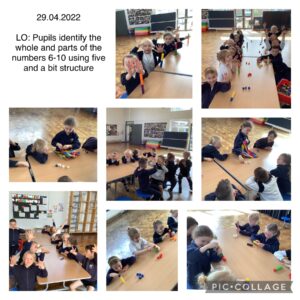
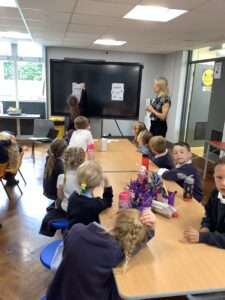
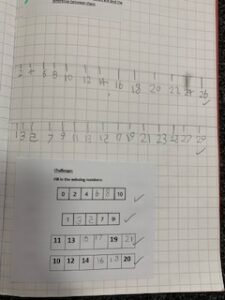
Geography topic : comparing the UK and Kenya
This half-term, we are geographers. As part of our Explorers topic, we’re comparing a place in the United Kingdom with a place in another country. We are comparing Kenya to the United Kingdom and Nairobi to London. We are focussing on the physical and human geography of these two places and noting the similarities between the two capital cities. Ask your child to tell you all about Nairobi.
As well as visiting Kenya, we have been learning about the seven continents, five oceans and about how the equator splits the earth into two hemispheres.
We have really enjoyed learning the continents and oceans by listening to and singing along to these great songs:
How can you help?
Google Earth is a brilliant tool to help develop children’s understanding of space, place, scale and interdependence. Zoom right in on your home and then zoom out to reveal the area of Leeds that you live in. Zoom further out to see what city you live. Zoom further for the county. A little further and you might start to spot some national parks. Further still and you can see the country that we live in. Keep zooming and you’ll see the continent we live in (though this isn’t labelled).
Quizzing your children about some locational knowledge will help them to remember important information.
- Which continent do we live in?
- Which country do we live in?
- In which hemisphere is our country located?
- Which county do we live in?
- Which city do we live in?
- Which part of Leeds do we live in?
- Which four countries make up the United Kingdom?
Living and learning : consent
This week, we have been particularly talking about consent (permission) in our Living and Learning lessons. We talk about consent all the time though, for example, when we’re taking photos or video.
We also talked about different scenarios and how we can respond appropriately.

20 May 2022
Please practise your spellings for another week.
Y1: have live give love was
Y2: race ice cell city fancy knock know knee gnat gnaw
We love to learn!
Our school vision is to be a happy and healthy place to achieve and believe. This week, we’ve seen so many children believe in themselves and achieve in many areas of their learning.
Even when things were a bit tricky, they persevered and achieved.
Well done Reception!
In maths, we built on our previous skills to compare attributes and quantities. Through practical activities and games, we thought carefully about which number is more or less. We used linear number tracks to play games that encouraged us compare numbers that are far apart, near and next to each other. (For example, 10 is a lot more than 2 but 5 is only 1 more than 4.)
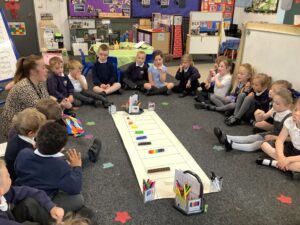
In the maths area, we continued to explore number bonds to 10. We used part-whole model plates to support our learning.
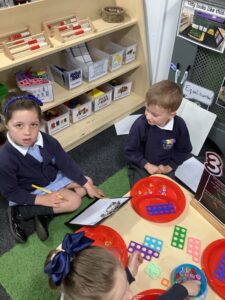
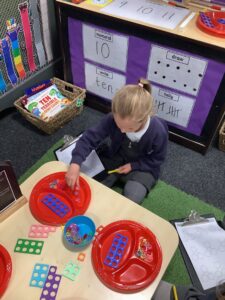
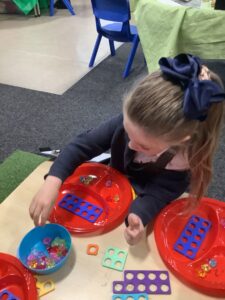
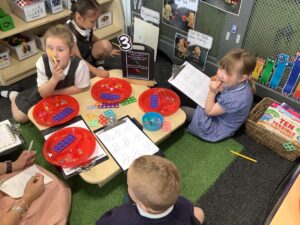 In literacy, we used our actions to recap Walking through the Jungle. We had a go at writing our own story. Before writing our stories, we made a list of other rainforest animals. We also thought about how they might move through the jungle.
In literacy, we used our actions to recap Walking through the Jungle. We had a go at writing our own story. Before writing our stories, we made a list of other rainforest animals. We also thought about how they might move through the jungle.
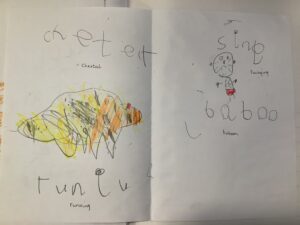
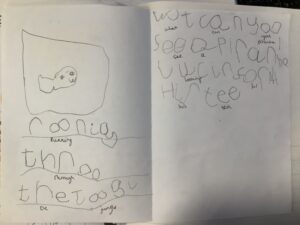
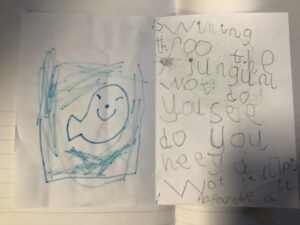
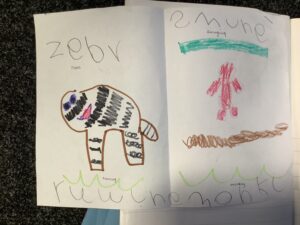
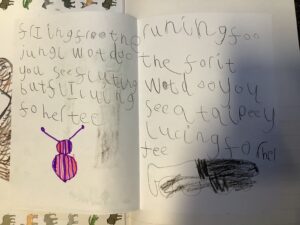 Check out what else we’ve been up to!
Check out what else we’ve been up to!
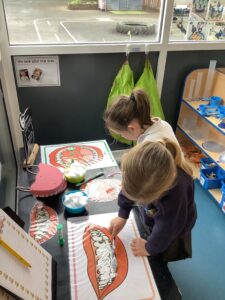
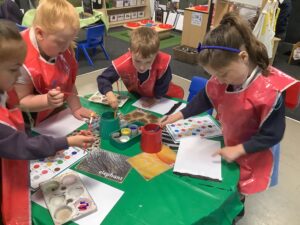
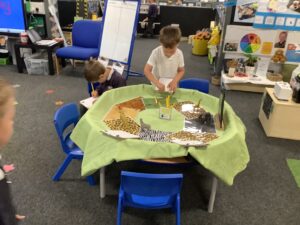
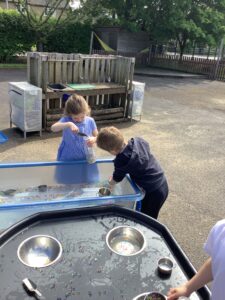
Home-Link Challenge
Gary the giraffe has made some number 10 towers. Can you work out the number bonds he has made?
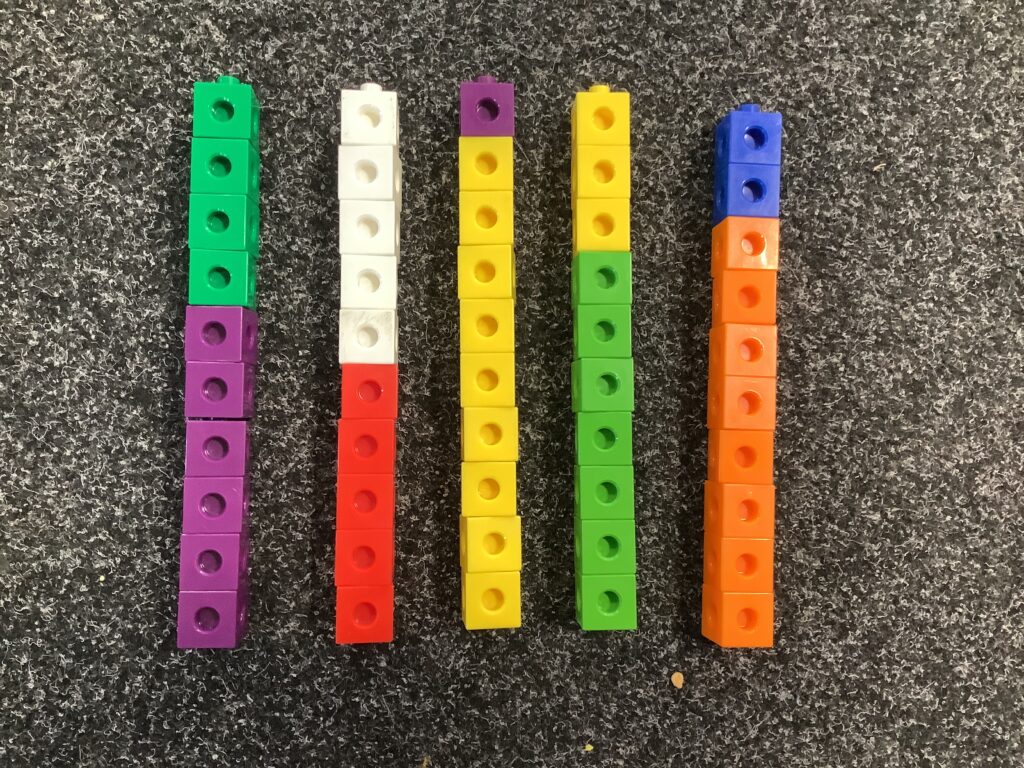 Next week, we’ll be having a fun-filled week of Jubilee activities!
Next week, we’ll be having a fun-filled week of Jubilee activities!
Have a lovely weekend.
This week’s message (Friday 20 May 2022)
This week’s message has two parts: one introduces this year’s annual survey, and the second comes from Mrs Allaway, our Maths Leader.
Annual survey
Every year, we invite you to complete a short survey. Your views matter. They help to shape what we do in the forthcoming year(s).
This year’s survey features a series of questions closely related to what Ofsted might ask parents during an inspection, plus a question about school uniform which we’re asking because of recent statutory guidance from the government.
Complete the St James’ CE Primary survey here. We’ll send a few reminders before the closing date, which is Friday 17 June.
It’s worth bearing in mind that if you raise in the survey something very specific that needs to be addressed, we can’t easily act on this without your child’s name. In fact, the survey isn’t the best place to raise individual, specific concerns – hopefully, you’re comfortable to speak with Miss Beatson or a class teacher about these instead.
Maths matters
Mrs Allaway writes…
As a parent or carer, you give your child their first experiences with Maths. Even if you don’t feel confident with Maths, you can still make a huge difference to how your child’s confidence and ability develops.
Be positive about maths
One of the most important things you can do is to be positive about Maths. Don’t say things like I can’t do maths or I hated maths at school. Your child might start to think like that themselves. Praise your child for their effort – this shows them that by working hard they can always improve.
Lifelong skills
A good understanding of everyday maths will help your child with important tasks, such as making decisions and understanding information. It will also help them develop essential lifelong skills:
- working out how much food is needed for a family meal and following recipes
- converting currency rates when abroad
- managing personal finances, budgeting and saving
- working out which are the best buys in the supermarket, checking change and working out sale prices
- getting to work on time, estimating how long a journey will take, knowing when to fill up on fuel
- knowing if the answer on a calculator is reasonable or if a wrong button was pressed
- keeping score in games and knowing what to aim for in order to win
- splitting the bill after a meal out with friends and working out what tip to leave
- DIY jobs such as painting and decorating or working out how many wall tiles are needed to cover an area
- reading data presented in graphs and tables and interpreting statistics in the news
Maths in everyday life
Point out the maths in everyday life. Include your child in activities involving money, cooking and travelling.
Baking and cooking are great ways for your child to practise lots of maths skills: weighing and measuring in grams and kilograms; reading scales; and measuring out capacities in litres and millilitres. Make the most of shopping trips and other outings. Help your child to recognise coins and count out particular amounts. Talk about working out totals and calculating change. Does your child understand the offers they see on signs or adverts in shops?
There’s a huge amount of maths in sports. Does your child like cricket? You can ask lots of maths questions. If there are two overs left in a game, how many balls does the bowler have left to bowl? How many more runs does the team need to win?
Can they tell the time? Having both traditional and digital clocks around the house will give your child opportunities to practise reading the time. Use timetables and TV guides. Give your child time problems to solve: Tea will be 30 minutes. What time will it be ready?
Being positive about maths and using maths in everyday life will really make a difference.
And finally, don’t forget the importance of knowing simple number facts (like two numbers adding to make 10: 2+8 or 3+7 for example) and times tables.
As always, speak to your child’s teacher if you’ve any questions, comments or concerns about your child’s learning in Maths.
Have a happy and healthy weekend.
20 May 2022
Our Talk Time this week relates to our recent Geography learning:
I know and can use the topic vocabulary from this half term.
Years 1 and 2:
- continent – a very large area of land
- globe – a model of the Earth which shows what it looks like from space
- ocean – a large area of water between continents
- equator – an imaginary line that goes around the centre of the Earth
- physical geography – physical geography looks at the natural things in our environment
- human geography – human geography looks at changes in the environment by humans
- population – the number of people living in a certain place
- national park – a park or area of land looked after by a country’s government
Years 3 and 4:
- climate zones – areas of the world with similar temperature and weather
- hemisphere – a half of Earth, divided into a northern and southern hemisphere
- equator – an imaginary line that goes around the centre of the Earth
- latitude – the distance north or south of the equator, measured in degrees
- tourism – travelling to a place for fun
- economy – how a country or place makes and spends money
- overtourism – when there are too many tourists and it results in conflict with local people who live there
- flood defences – used to prevent flooding in a specific place
Years 5 and 6:
- biome – areas of the world with similar climate, landscapes, animals and plants
- vegetation belt – an area with distinct plant types
- climate zone – areas of the world with similar temperature, weather and precipitation
- natural resources – something that is found in nature and can be used by humans
- exports – goods that are sent to other countries for sale
- deforestation – the destruction of forests by humans
- agriculture – growing and harvesting crops and raising animals; another word for farming
- indigenous people – the earliest or original inhabitants of a place
Encourage your child to think back to their Geography learning so far. The following questions might prompt your child to remember even more about the vocabulary:
- What does this word mean?
- Can you use the word in a sentence?
- Can you (where possible) give an example of this?
- Have you seen a piece of art that links to that word?
- Can you link this word to one or more of the other words?
- Which of these words would you group together?
20 May 2022
This week, the children have been using words with the prefixes ‘mis’ and ‘re’ at the start. Learn the words below ready for a test on Friday 27th May 2022.
- reappear
- rebuild
- misread
- return
- misbehave
- reapply
- redo
- mishear
- miscalculate
- misprint
For some creative ideas on how to make learning spellings more fun, check out our super spelling strategies guide on the website.
Living and Learning: What is consent?
In this week’s Living and Learning lesson, we discussed the meaning of the word ‘consent.’
It means you agree to something.
I think consent is saying yes.
Following our conversation, the children read an overview about a book named ‘Consent For Kids’ and completed the reading activity below.

LO: RIC
Consent means giving someone a choice about touch or actions and respecting their answer.
Consent (for Kids!) is an empowering introduction to consent, bodily autonomy, and how to respect yourself and others. Consent is like being ruler of your own country…population: YOU. This is a smart, playful guide to consent and bodily autonomy, packed with bright and energetic illustrations. Readers will learn about boundaries and how to set them; ways to respect themselves and others; what to do if someone makes them feel uncomfortable or unsafe; and much more. Along the way, they’ll be encouraged to reflect on (and improve!) their own behaviour and to practice consent in their daily lives. Whether you’re looking for a simple guide for teaching consent or searching for a way to talk to your child about what it means to be in control of their own body and respect others’, look no further! This humorous and insightful book is the perfect teaching tool, conversation starter and empowering resource for educators, kids, and families everywhere.
autonomy – letting children know that they have control over themselves and the choices that they make
- Name 2 things that readers will learn.
- Look at this sentence.
Along the way, they’ll be encouraged to reflect on (and improve!) their own behaviour and to practice consent in their daily lives.
What do you think ‘along the way’ is referring to?
3. Why has the author written two words in red?
Ask your child about this learning. What can they tell you about consent?


Brownlee Triathlon
Children from Years 3, 4 and 5 took part in the Brownlee Triathlon this week. The event started with swimming, followed by cycling and finishing with running. The children represented St James’ exceptionally well and we were very proud of them all.
“I enjoyed the swimming and I could see all the teachers pulling a ‘wow’ face which made me feel proud.” Harley
“It was great because everyone was cheering each other on. The swimming was my favourite part because I was the first person who made it all around the pool.” Leah
